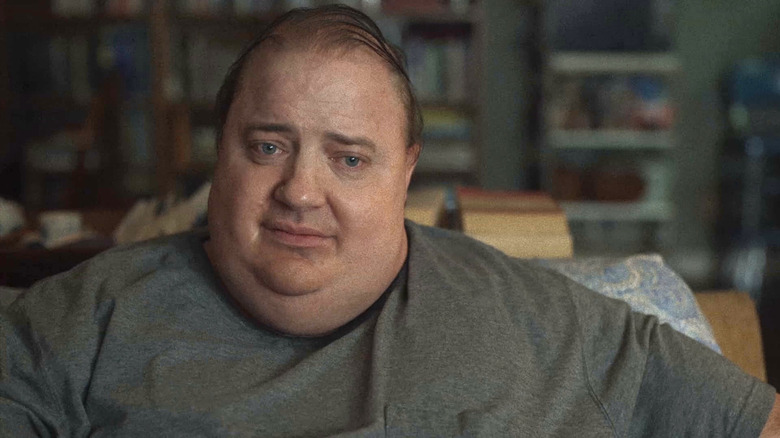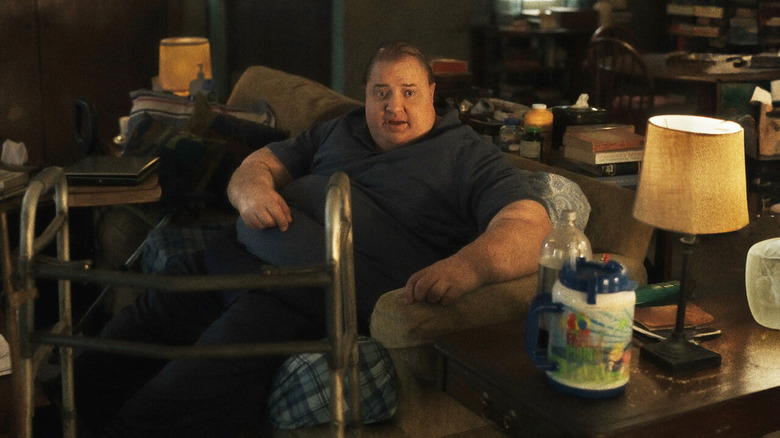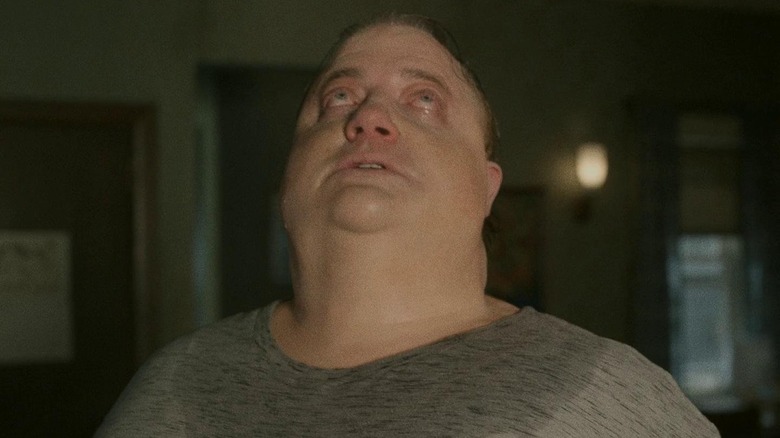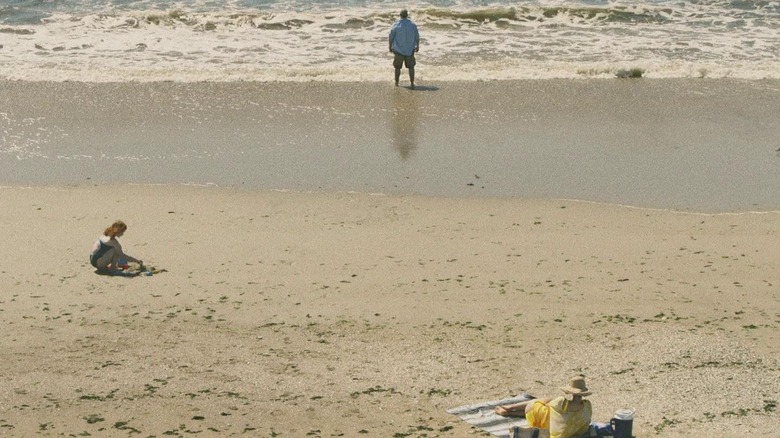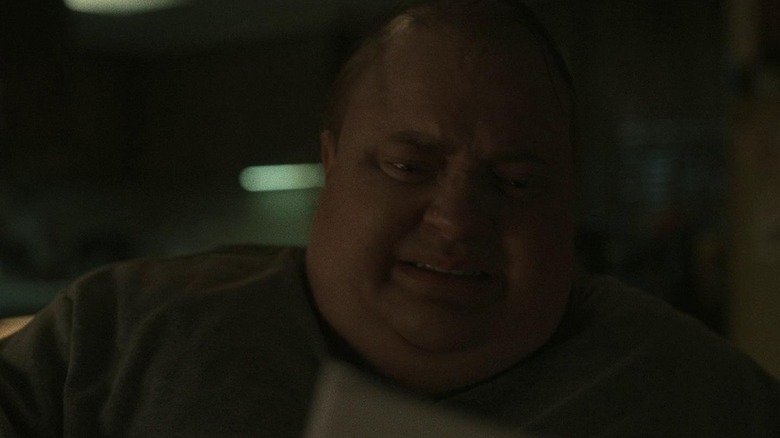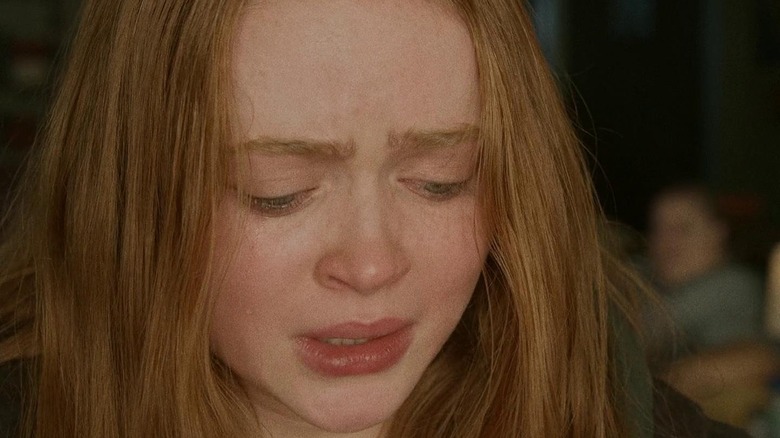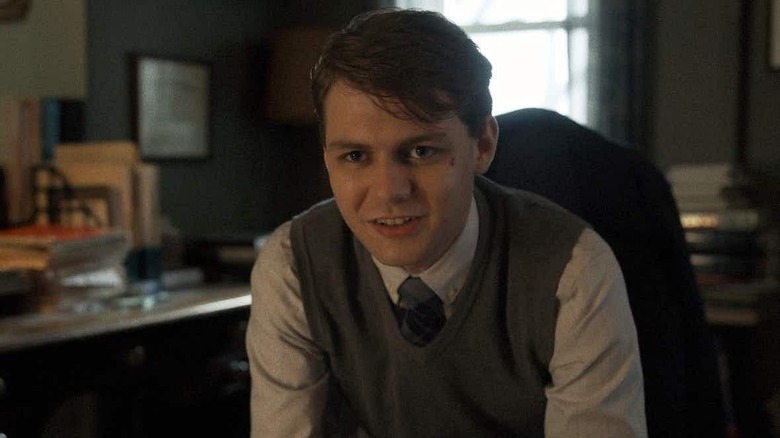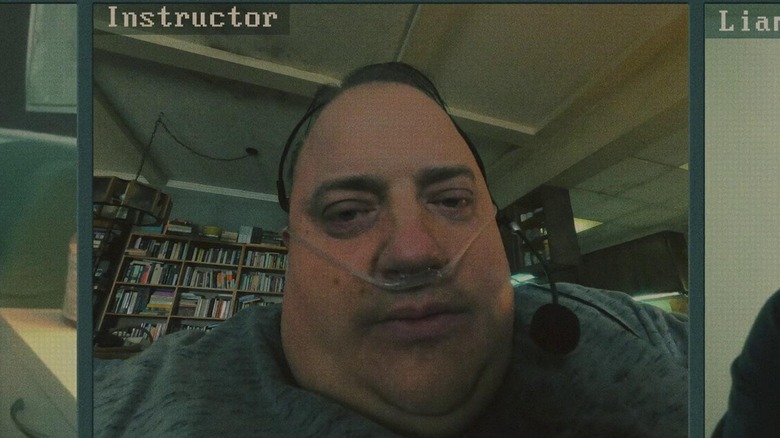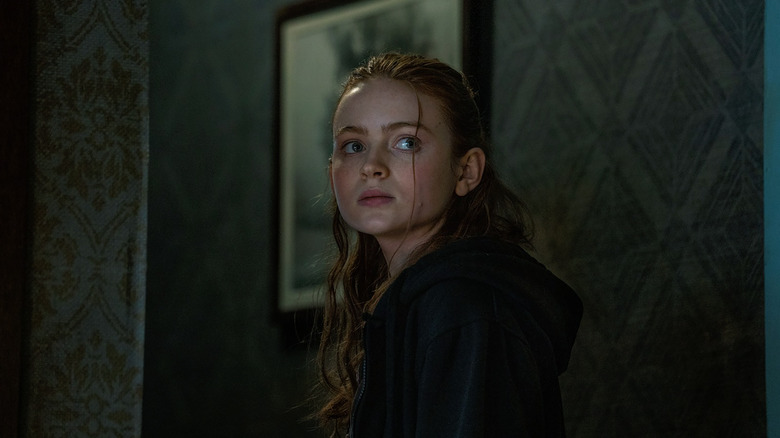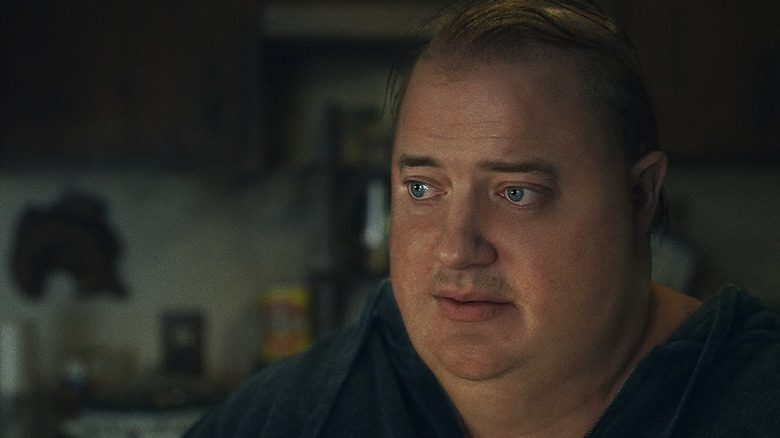The Whale Ending Explained: Step Into The Light
We may receive a commission on purchases made from links.
2022's "The Whale" is an important movie. It's the movie that helped bring "The Mummy" star Brendan Fraser back to prominence in Hollywood after years of being in the background. It was also director Darren Aronofsky's first film following 2017's rather divisive "Mother!" The film is adapted from the play of the same name by Samuel Hunter (who also wrote the movie) and centers on a reclusive, 600-pound English teacher who is looking to reconnect with his estranged teenage daughter.
Released by A24, the film was met with a somewhat mixed response from critics, though Fraser did end up winning an Oscar for his work in the drama. But it's a movie that leaves the viewer with some questions, as the ending isn't crystal clear, by design. So, what happens at the end of "The Whale?" What does it all mean? We're going to break down the film's ending, the key questions viewers may have, and do our best to get to the bottom of this uniquely human tale.
What you need to remember about the plot of The Whale
"The Whale" centers on Charlie (Fraser), an online schoolteacher whose binge eating has cost him his mobility, his health, the possibility of regular human interaction, and any semblance of normalcy. When he finally starts suffering from congestive heart failure and refuses to go to the hospital, he is given a prognosis of just a few remaining days. Charlie doesn't change his ways or seek proper medical attention, but he does finally reach out to his estranged daughter Ellie ("Stranger Things" star Sadie Sink). He tells Ellie that she can have the entire $120,000 in his bank account if she agrees to see him without her mother knowing about it. She agrees.
At their first meeting in years, the callous teenager challenges her father to walk toward her without the assistance of his walker. He fails at first, but in the final moments of the movie, he actually succeeds. As he makes his way to her, she reads him an analytical essay about "Moby-Dick" that she wrote as a child. She does so at Charlie's request — he recites it to himself often throughout the film. He even has another character read it to him during his first health scare at the beginning of the movie because he wants it to be the last thing he hears before he dies.
Charlie makes strides in repairing his relationship with Ellie over the course of the film, but he is scared of re-entering her life after his family fell apart when he left his wife for one of his male students. This love, which once offered solace, quickly became its own source of tragedy for Charlie when severe depression and emotional turmoil led his partner into life-threatening anorexia and suicide. Charlie avoids memories of his late partner, even the happy ones, and keeps them hidden away in a locked room or tucked into a bookshelf. But he does allow himself to ruminate on a happy memory of his family — one that is key to the film's ending.
What happens at the end of The Whale?
The ending of "The Whale" is probably what helped secure Fraser his Best Actor Oscar. It's where his performance comes full circle and Charlie's emotional journey reaches its culmination, even if it is a little abstract. He gets closure with his estranged daughter and, seemingly, finds some peace.
The final moments of the film see Charlie having one last confrontation with Ellie. She is initially mad at him for replacing her essay with the one she had written years ago about "Moby-Dick." At his insistence, Ellie reads the essay out loud, which finally provides a bit of reconciliation between the two. Charlie makes his way to where his daughter, unassisted, as she stands in his doorway. This is something he failed to do on her first visit. Charlie, after much effort, makes it to the door and is then seen levitating and disappearing into his fondest memory of his family. In this memory, he stands on the ocean shore with his feet in the water. Meanwhile, his young daughter plays in the sand and her mother watches on.
Even though he is kept at bay by his affair, a custody battle, and eventually his weight gain, Charlie knows they are out there living their lives still and thus allows himself to preserve a happy memory of them at the beach. Because things get fantastical in the end, some viewers are left to question what is real and what isn't in those closing moments. What is real is the emotional closure for both Ellie and Charlie, regardless of what really happens in the physical world.
Did Charlie die at the end of The Whale?
The most obvious conclusion to draw from this ending is that Charlie has perished from the congestive heart failure that is slowly killing him over the course of the film. The movie catalogs his final days, beginning on a Monday when his dear friend and nurse, Liz (Hong Chau), says he will be dead by the weekend. Although we don't see Charlie's dead body or his funeral, we know he is on the brink of death and that the strain he puts on his body by walking towards his daughter will likely cause his heart to finally fail. However, the ending is slightly ambiguous.
Part of the reason why Charlie's death is questionable is because it's unclear whether he wants to die or not. There are moments where he indulges dangerously in junk food and others where he stops himself, at least momentarily. His commitment to over-eating and reluctance to seek medical attention suggests that he is suicidal, but certain things hint at an optimism or will to live. He puts out apples for a bird that comes to his windowsill every day, something Ellie notices right away. Charlie also makes a last-ditch effort to reconnect with his daughter, and in getting to know her, finds a newfound love of humanity in general, declaring that, "People are amazing!"
It almost seems too cruel that this reconnection with Ellie and subsequent optimism would come too late — when his body was too far gone to be saved — and that he would die anyway. So maybe that's not what happened. It is one of those endings that is largely left up to interpretation, but the emotional resonance largely remains intact despite one's interpretation.
Does Charlie go to Heaven?
In Charlie's final moment, he retreats again to a memory of himself and his family on the beach. This memory, which Charlie references in conversation with his ex-wife in a previous scene, was a true moment of peace and clarity of spirit for him — perhaps the last he ever felt. So, is this Heaven? The answer might guide the viewer as to whether or not Charlie died.
It's interesting that Charlie would end up in some version of Heaven because of his complicated relationship with religion. Thomas (Ty Simkpins of "Insidious" and Jurassic World" fame), a missionary from a local New Life church, is a frequent guest at Charlie's house in the week leading up to his apparent death. Charlie's late boyfriend Alan was the son of the head of the church and a devout follower. When his father found out about Alan's relationship with Charlie, he exiled him from the church, which is what sent Alan into a depressive episode that eventually led to his death.
Charlie was at odds with Alan's faith when he was alive and remains at odds with it after his passing. This religion vehemently rejects homosexuality and insists that a "sinner" like Alan or Charlie would never get to Heaven. The missionary encourages Charlie to deny his sexuality and bodily sins and ask for God's forgiveness so that he might gain salvation in the afterlife, but he refuses. How ironic would it be if Charlie ended up in a blissful eternity anyway?
The religious themes of the movie suggest that Charlie did in fact die and go to Heaven in the end, but they may have just alluded to a kind of spiritual peace or death of ego that does not necessarily imply a physical death. Again, it's not one of those movies that paints a crystal clear picture and holds the viewer's hand explaining everything plainly.
Explaining Ellie's essay in The Whale
Beyond the metaphor of "Moby-Dick," a tale that has been adapted many times over the years in many ways, Ellie's essay about the famed book is central to the film. Yet, we never get to hear the essay in its entirety, as the last words of the essay are never read aloud. Even in the film's screenplay, those words are cut off. So, we're left to wonder what those words are. Yet, the meaning of Ellie's essay is still pretty clear, given what is in the film.
A few things remain sacred to Charlie as he slips into complete isolation and a fatal health crisis. One is Ellie, whom he hasn't seen in years when the film begins. He remains connected to her through this essay. He is particularly fixated on a line where she says that "Moby-Dick" allowed her to "think about my own life." This follows her analysis that Ahab thinks killing the whale will make his life better, but the whale is completely emotionless. This suggests that Ellie views her father as her own kind of whale — not because of his size, but because of his estrangement.
Ellie thinks Charlie is the cause of all the pain in her life and doesn't care about her, having not heard from him in years. In reading the essay back to her estranged father, though, Ellie clearly has an epiphany about her own life. It's important to look back at the final bit of that essay to try and gain some insight into that epiphany:
"I was very saddened by this book, and I felt many emotions for the characters. And I felt saddest of all when I read the boring chapters that were only descriptions of whales, because I knew that the author was just trying to save us from his own sad story, just for a little while. This book made me think about my own life, and then it made me feel glad for my..."
Again, we don't know the final words of that essay but if it were just the word "father," for example, that might provide some catharsis for her, in the here and now, when it comes to their relationship. Whatever those words were, it doesn't matter in the grand scheme of things. What matters is that Ellie's own words helped to repair her relationship with Charlie, in the end.
What happens to Thomas at the end of The Whale
Though "The Whale" is light on characters, Thomas is a key player, yet he's also largely disconnected from the central story. A missionary for the New Life Church, Thomas visits Charlie early in the film and wishes to "save" him. The two are at odds, for various reasons.
Thomas also visits a disgruntled Liz, who chastises him, explaining that she is the adopted daughter of New Life's head pastor and Alan was her brother. Religious guilt drove Alan to suicide, and Charlie coped with emotional eating. Despite Liz's wishes, Thomas still wants to help Charlie.
In a key scene, Ellie places Ambien in Charlie's food to knock him out, and Thomas unexpectedly arrives. Ellie then convinces him to smoke pot with her, and Thomas confesses to stealing money from his youth group and running away from home, a conversation that Ellie secretly records. Thomas later visits Charlie one last time to tell him that he is moving back home as Ellie sent his confession to his family. They forgave him and convinced him to return. Thomas tries to preach Romans 8:13 to Charlie, but he scolds the young boy, who is attributing Alan's death to being gay.
In the end, Thomas fails to "save" Charlie (though Charlie is saved in some way), but the boy does find forgiveness from his family. He also, despite heading back to a life of strict religion, may be taking with him some new perspective in the world thanks to his experience with Charlie. In the end, he is changed greatly by his run-in with Charlie.
In an interview with /Film in 2022, Aronofsky and Hunter explained that they had a hard time casting Thomas. As Aronofsky noted, it's a tricky role because "it's an 18-year-old kid who you have to believe is innocent enough and blocked off in the world to be a true believer without any cynicism, but is also a liar, and has a secret." Adding to that, Hunter noted that Simpkins has spoken publicly about his personal connection to Thomas:
"Both Ty and I share a past with our faith, where we were desperately trying to negotiate our faith with the world that we saw in front of our eyes. Ty brought a lot of that personal stuff to the performance, I think."
Why Charlie finally shows his face to his students
Charlie makes his money by being a teacher online (as he can't really leave his apartment to teach in person) and is, on some level, afraid to show himself to the world, hiding his webcam during all of his classes. One of the most important moments in the third act of the film is when Charlie reverses course and finally shows himself to his students. But why does he do this, exactly?
It stems from a triggering moment Charlie has when Dan, the pizza delivery boy, sees him for the first time and has a horrified reaction. This leads to a particularly rough binge-eating episode. Then, in a heated, reactionary moment, Charlie sends a very inappropriate email to all of his students, essentially telling them to forget about the classwork he had assigned and just write "something honest." They do precisely that.
During his next (and final) class, Charlie explains that, as one might expect, he is being fired over the email he sent to his students. He then proceeds to read some of the honest submissions they sent in. As Charlie explains, in a form of reciprocation, he decides to finally turn on his webcam to be honest with them as well. This draws a mixed reaction from the students, but it is a moment of emotional honesty before Charlie gets true closure with Ellie.
He caps off the whole thing by violently destroying his laptop. That punctuates the catharsis of the moment. Ultimately, it was all about Charlie being honest, both with himself and with his students.
What has the cast and crew of The Whale said about the ending?
Fraser has a theory about the film's ending that might surprise you. Speaking to Entertainment Weekly, he revealed that he does not think the character perishes in film's final moments:
"[I]t's a Herculean effort that he makes to even get to his feet. For him to finally break through to [Ellie], humble himself before her, and let her know that he made a mistake and is sorry for it. While his life has not physically ended in that moment, I think that he knows he doesn't need to live any longer, which is why he takes off his breather, he's got her reading the essay, and he does take to his feet like three Olympic dead-lifters, takes his baby steps to his baby, and in that beautiful two-shot, a great white light appears, and they look skyward. Depending on your belief system, spiritually or otherwise, we see that Charlie — with a touch of magic realism — finally does fly."
The white light and skyward look, along with the state of Charlie's health, definitely suggest that this is the moment his life "physically" ends, despite Fraser's interpretation. However, Charlie's march toward his daughter could be interpreted as a purely symbolic moment in itself.
"I think it's an apotheosis — you can take it how you want it," added Hunter. "In the play, the way I wrote it is that you hear a sound of waves and they slowly intensify through that scene, so, there's a way to read it both ways. It wants to be miraculous, either literally or figuratively, and I think you can watch it either way."
The play The Whale is based on had a different ending
As it turns out, the choice to end the film with Charlie standing on the beach was entirely Aronofsky's idea. The production of the play makes reference to Charlie's aforementioned memory through the sound of waves, but it ends abruptly, mid-sentence, with Charlie making his way to Ellie. Speaking to Digital Spy, Hunter revealed he didn't know about the beach scene until he saw the rough cut of the film:
"It was just kind of an incredible surprise [...] I was so intensely moved by it. I was just like, 'Oh my God, that's perfect.' [...] In the play, it's the one moment that I script as he's giving that monologue about the Oregon coast that the sound of waves comes in. In the play, it's heightened, and expands a little bit. I think Darren [Aronofsky] took that idea, and kind of ran with it, in this gorgeous way."
Even though the movie ends in a slightly less ambiguous place than the stageplay, there is clearly still room for interpretation. Just like in the original piece from which it is adapted, the film dissolves its realism in this final scene and moves to a place of symbolism or magical realism. No matter how you interpret the ending of "The Whale," it certainly feels like a conclusive end to Charlie's story.
"The Whale" is currently streaming on Netflix, or you can grab it on Blu-ray/DVD via Amazon.
